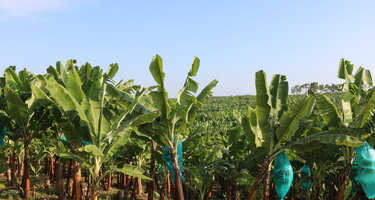Legal studies on living wage mechanisms
The studies form part of the overarching project “Towards Living Wages in the Banana Sector” by the German Retailers Working Group on Living Incomes and Living Wages.
The objective was to identify, from a legal perspective and based on the local regulatory framework, the most suitable modality for the recognition and payment of the wage differential or voluntary contribution for workers in the context of banana plantations (Fairtrade and non-Fairtrade) in Colombia, Dominican Republic, and Ecuador.
In those studies, the legal and fiscal implications of three payment modalities were observed: as part of the wage, as an extra-wage bonus, and as payment through the Fairtrade Premium Committee or another non-profit organization. In the first two modalities, the buyer provides funds to the plantation so that they be paid to workers as part of the wage or as an extra-wage bonus. The third mechanism applies only when a plantation can make use of a non-profit organization (Foundation or Association), making the payment through this organization.
Each of these forms of recognition and payment is analyzed in accordance with the applicable legislation, in order to determine the most viable option for each country.
Recommendations for paying Living Wage Differentials / voluntary contributions in the banana sector
It is to be stressed, that Living Wage Differentials / voluntary contributions are only temporary measures to level worker’s income, since achieving a living wage is the ultimate goal. Therefore, definitive solutions to ensure that all workers receive at least a Living Wage require collective bargaining agreements or decisions by local authorities establishing wage improvements.
The general conclusion of the studies on the three payment modalities are:
- Paying voluntary contributions as part of the wage or as an extra-wage bonus increases employee benefits, the tax base, and administrative processes, which in turn raises associated costs. Furthermore, incorporating these benefits into the labor relation may pose risks of labor litigation or disputes, since they become responsibilities that employers may not be able to sustain over time, given that they are non-guaranteed income for both the plantation and workers.
- Therefore, the most advisable temporary distribution alternative on those banana plantations — directly benefiting the worker and incurring the lowest wage, tax, and administrative costs for employers — is through a non-profit organization, which from its constitution has an aligned vision with contributing to sustainable livelihoods of workers.
- In the case of Fairtrade certified plantations, the Fairtrade Premium Committee and its legal corporation structure can be used for this. Nonetheless, employers should consider the recommendations in terms of denomination, application mechanism, and expected risks (such as those of litigation or labor disputes).
- If plantations lack the support of a foundation of their own or from the region, the most feasible option is to make the payment as an extra-wage bonus. Here, the study gives recommendations for plantations to prove their non-wage nature. Furthermore, it is advised to define a clear agreement between parties on the recognition of these benefits and to bear in mind the possible risk of litigation or disputes over labor issues.
